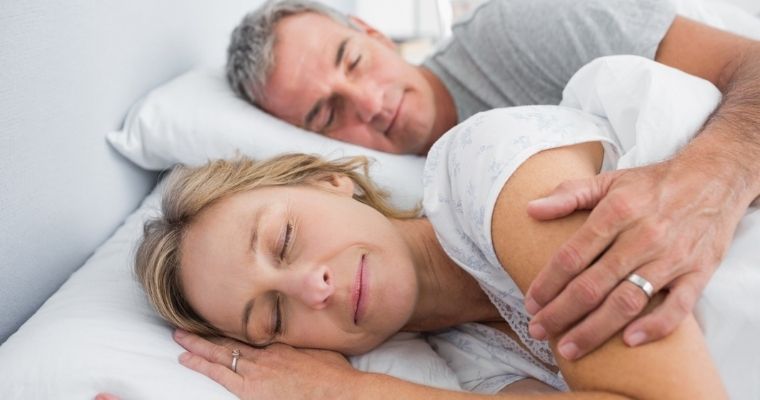Can Sleep Apnea Cause TMJ?

Sleep apnea and TMJ disorders are both conditions that affect your sleep schedule and overall health.
According to research… This text opens a new tab to the Healthline website…, one of the most common causes of TMJ disorders (or TMD) is lack of sleep.
And the main sign of obstructive sleep apnea (OSA) is difficulty sleeping at night.
So you may be wondering:
Can sleep apnea cause TMJ disorders?
In this blog, you’ll find that very answer and why that connection matters.
Let’s dive in.
Does sleep apnea cause TMJ disorders?
It definitely can.
Sleep apnea and TMD are conditions that can develop together and exacerbate a preexisting TMJ disorder.
A study… This text opens a new tab to the NCBI website… found that individuals with two or more signs or symptoms of OSA had a 73% greater incidence of TMD than those with fewer signs or symptoms regardless of:
- Age
- Sex
- Race/ethnicity
- Weight
- Smoking history
How is that so?
Obstructive sleep apnea causes your airway to collapse when you’re trying to sleep.
As your airway collapses, your body automatically pushes the lower jaw forward.
This constant motion puts unnecessary stress and pressure on your jaw joints, which can eventually lead to TMD.
How does TMJ affect sleep?
TMJ disorders are painful and annoying to deal with.
They can cause you to miss out on getting the restful sleep you need to function properly.
If you have TMJ disorder, you may clench or grind your teeth at night.
Clenching not only puts strain on your teeth and jaw, but it can cause you to wake up from the discomfort.
And teeth grinding disrupts your sleep due to the loud sound and discomfort.
Sometimes, teeth grinding can be so loud that it may wake your loved one at home.
What happens if TMD is left untreated?
TMJ disorder will continue to affect your sleep and well-being if it goes untreated.
It can lead to serious health risks such as:
- Chronic jaw pain
- Frequent migraines
- Degenerative arthritis
- Tinnitus
- Extreme fatigue
- Anxiety
- Depression
- Tooth damage or loss
- Vision problems
- Compromised hearing
- Vertigo (trouble balancing and dizziness)
So seeking treatment is essential to your quality of life.
And:
Because TMJ and sleep apnea go hand in hand, it’s vital to treat your sleep apnea as soon as possible.
How do you treat sleep apnea?
Your dentist in Wichita, KS can help you find relief.
They’ll partner with your primary care physician for diagnosis and to determine the best treatment for you.
Two of the most common treatments for sleep apnea are:
- CPAP therapy
- Oral appliance therapy
CPAP therapy
CPAP therapy involves wearing a nosepiece or mask while you sleep at night.
The nosepiece/mask is attached to a machine that delivers a continuous oxygen flow into your lungs.
Oral appliance therapy
This treatment involves wearing an oral appliance at night. An oral appliance is a custom-made mouthpiece that fits over your teeth like a retainer. It’ll support your jaw in a forward position to keep your airway open.
Need sleep apnea treatment in Wichita, KS?
Our professional dentists Dr. Farmer and Dr. Williamson are here for you!
We’ll work with you to find the best possible treatment option to help you find relief.
Schedule a consultation for sleep dentistry today.
Or you can:
- Call us at (316) 722-1110
- Email us at appointments@dentistswichita.com
Dr. Eric S. Farmer DDS is located in Wichita, KS, and proudly serves surrounding communities, including Maize and Valley Center, KS.


